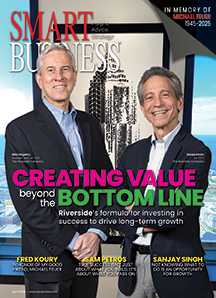When Bobby Rahal met Danica Patrick, he knew she was the one.
The former Indianapolis 500 winner and Pennsylvania car dealership owner recognized Patrick’s desire to succeed in a predominantly male industry. But he didn’t plan for his newest team member to rewrite Indy history by finishing fourth in the 2005 race.
“She’s transcended the sport in a lot of ways,” he says. “And while I expected that to happen at some point in time, I didn’t quite expect it to happen as quickly as it did.”
Rahal co-owns Hilliard-based Rahal Letterman Racing with “Late Show” host David Letterman. The open-wheel racing team employs 75 people and reported $20 million in 2005 revenue.
Speaking to Smart Business from Florida’s Homestead-Miami Speedway, Rahal discussed how he chooses his crew, both on and off the track. Several weeks later, Rahal Letterman Racing driver Paul Dana died following a practice accident at the speedway, and the team withdrew its other entries for that race.
How do you recognize talent?
You bring people in because of a reputation they may have in terms of their capability; however, we take what we hear from the outside with a large grain of salt. It’s only after they’ve been with us for a while do we really come to know their contribution and whether that meets our standards.
We set very high standards because we’re here to win. While a lot of people talk the talk — everybody says they want to win — there are very few that really do want to win. We push them all year to continually improve themselves because, in the end, if they improve, then we improve.
This is the ultimate team sport, where everybody’s success or failure is intimately tied. Unlike other supposed team sports, like football or baseball, no one person in racing can stand out above the rest because everybody’s results are the same, which is a true reflection of what the concept of team is all about.
How do you maintain high standards?
We’re constantly examining everything we do on any given day. In motor racing, your results are pretty immediate and you know fairly quickly whether you’ve done the job correctly or not.
As a result, it gives you ample opportunities to investigate and look into what you’re doing and whether you can do it better — everybody from the driver and the owner to the engineers and the mechanics, especially where pit stops are concerned.
The expectation at Rahal Letterman is that you do what it takes. That example starts with me and runs throughout the company. Every employee understands that they have to be a leader in their own right.
We don’t have time for people who are just along for the ride. That’s really a cancer to an organization. Everyone in the operation knows who’s carrying their weight and who isn’t. We don’t accept those who only commit 50 percent of themselves to us.
There are a lot of people who can do the job, but what’s the attitude that they represent? Is it a positive, committed attitude, or is it one that is begrudging? We want people who are ready to hold their hand up and make their case because that’s the only way we’re going to go forward.
The worst things any organization can have are the Monday morning quarterbacks.
It takes no commitment to criticize after the fact or to make comments as though to separate themselves from everybody else, the ‘Well, if somebody had asked me … ’ kind of attitude. That is a cancer, and we will not accept that.
How do you promote a winning attitude?
By your own example. You can’t ask a lot from other people if you don’t ask the same of yourself. While there are high standards and demands within our organization, we also try to create a family atmosphere. It’s not just a place to go to work, it’s an environment that provides for advancement and learning.
Everybody wants to get paid, but the environment is as crucial a factor in their satisfaction with their job, and in some respects, even more so. They feel that there’s a sense of obligation from the company to the employee and vice versa.
In this environment, they can grow intellectually as well as financially, and that has a huge effect. We’re not the biggest payers out there, but we create an atmosphere and an environment that makes up the difference and then some.
It’s not something you can do once a quarter and create this concept of team. It really takes confidence, daily care and feeding because it’s a very fragile concept. Every day, we practice the things that create the kind of environment we want: interest in them as people, not just as team members or employees, being communicative with them and sharing information that ultimately impacts them.
(It’s) making an inclusive environment where there’s a sense of ownership. We do that daily, and it’s not just me, it’s at every level and facet of the organization.
HOW TO REACH: Rahal Letterman Racing, www.rahal.com

